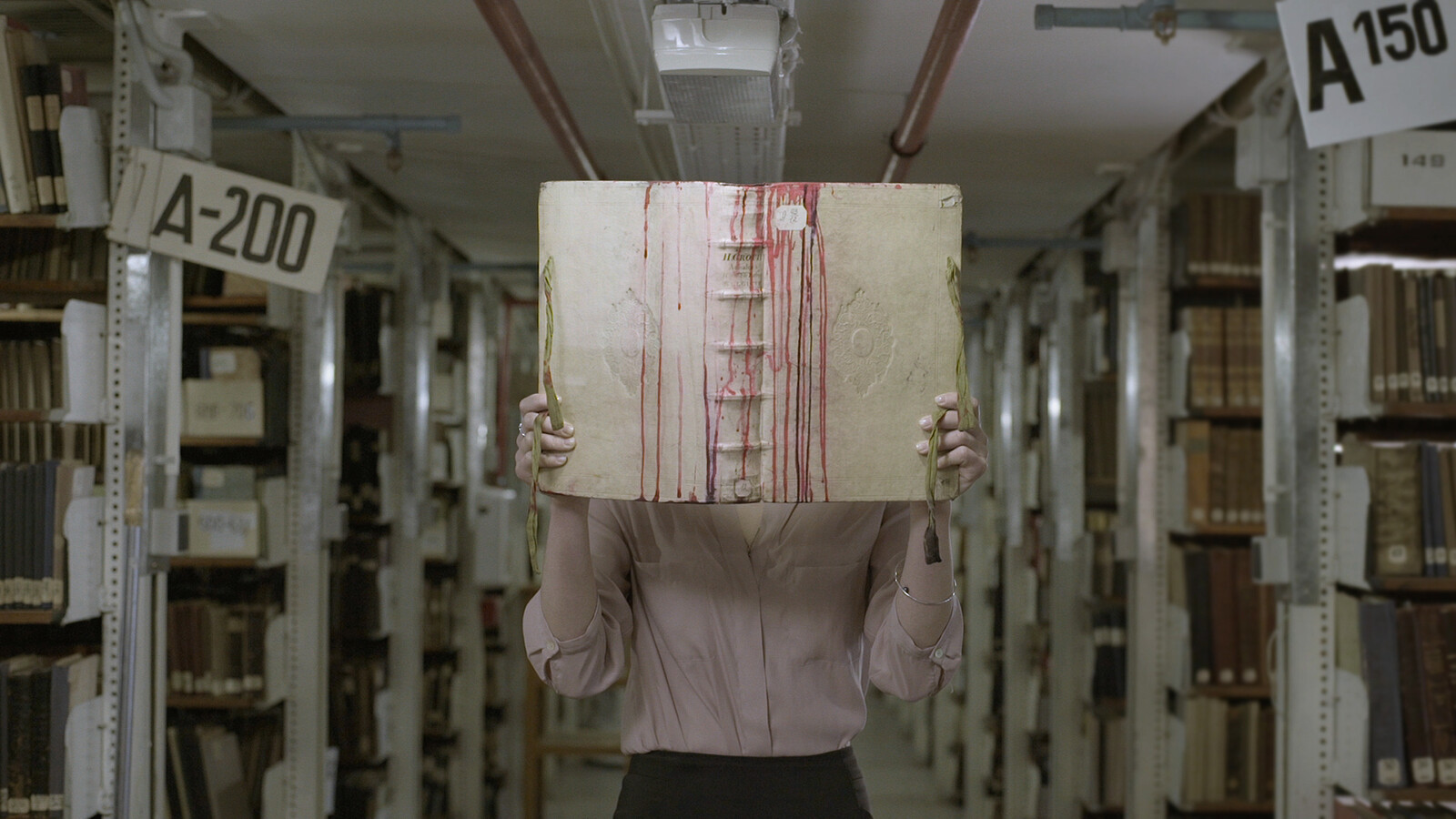Citizens of the Cosmos
February 8–April 3, 2022
10, Krymsky Val
10, Krymsky Val Moscow Russia
Moscow
Russia
The Tretyakov Gallery presents an exhibition of films by Anton Vidokle that trace the influence of cosmism on art, culture and philosophy in Russia in the twentieth century and that suggest its relevance to the present time. Combining film, installation, historical research, a new book and a program of discursive events, this exhibition highlights the ecstatic and paradoxical dimension of cosmist ideas, which engaged not only scientists and technologists, but also numerous artists, filmmakers, writers, poets and philosophers.
At the center of the exhibition is the film trilogy Immortality for All, made by Anton Vidokle over a period of five years, beginning in 2013. The films are presented in a specially designed hexagonal cinema, constructed for this exhibition in Hall #38 of the New Tretyakov Gallery building. An important part of the exhibition is a new analysis of historic works in the permanent collection of the museum and their relation to the philosophy of cosmism, developed as a series of text commentaries by the artist Nikolay Smirnov and curator Kirill Svetlyakov. While walking through the museum, the audience encounters numerous works by twentieth century artists that directly or indirectly address central cosmist themes such as the overcoming of death, zero gravity and space flight. The exhibition includes a comprehensive timeline of Russian cosmism, spanning the eighteenth century to the present day, as well as a public program comprising an extensive lecture series organized by the researchers from the Fedorov Library, as well as screening programs organized by the Moscow International Experimental Film Festival (MIEFF).
“Anton Vidokle’s trilogy is not an illustration of the philosophy of Russian cosmism. These films suggest a virtual experience of immortality, insofar as they deny the experience of death through the denial of cinema.” –Kirill Svetlyakov, the curator of the exhibition.
Immortality for All: a film trilogy on Russian cosmism.
Combining essay, documentary and performance, Vidokle quotes from the writings of cosmism’s founder Nikolai Fedorov and other philosophers and poets. His wandering camera searches for traces of cosmist influence in the remains of Soviet-era art, architecture and engineering, moving from the steppes of Kazakhstan to the museums of Moscow. Music by John Cale and Éliane Radigue accompanies these haunting images, conjuring up the yearning for connectedness, social equality, material transformation and immortality at the heart of cosmist thought.
Shot in Siberia and Kazakhstan, as well as Moscow and Arkhangelsk regions, the first film in the trilogy, This is Cosmos (2014), comprises a collage of ideas from the movement’s diverse protagonists, including founding philosopher Nikolai Fedorov. Fedorov, among others, believed that death was a mistake—a flaw in the overall design of the human, “because the energy of cosmos is indestructible, because true religion is a cult of ancestors, because true social equality is immortality for all.” For the Russian cosmists, the definition of the cosmos was not limited to outer space; rather, they set out to create “cosmos,” or harmonious and eternal life, on Earth. The ultimate goal, as illuminated in the short film, was “to construct a new reality, free of hunger, disease, violence, death, need, inequality—like communism.”
The second part of the trilogy, The Communist Revolution Was Caused By The Sun (2015), looks at the poetic dimension of solar cosmology developed by Soviet biophysicist Alexander Chizhevsky. Shot in Kazakhstan, where Chizhevsky was imprisoned and later exiled, the film introduces Сhizhevsky’s research into the impact of solar emissions on human sociology, psychology, politics and economics in the form of wars, revolutions, epidemics and other upheavals. The film aligns the life of post-Soviet rural residents and the futurological projects of Russian cosmism to emphasize that the goal of the early Soviet breakthroughs aimed at the conquest of outer space was not so much technical acceleration, but the common cause of humankind in their struggle against limitations of earthly life.
The trilogy’s last part, Immortality and Resurrection for All! (2017) is a meditation on a museum as the site of resurrection—a central idea for many cosmist thinkers, scientists and avant-garde artists. Filmed at the State Tretyakov Gallery, the Moscow Zoological Museum, the Lenin Library and the Museum of Revolution, the film looks at museological and archival techniques of collection, restoration and conservation as a means of the material restoration of life, following an essay penned by Nikolai Fedorov on this subject in 1880s. The film follows a cast comprised of present-day followers of Fedorov, several actors, artists and a Pharaoh Hound that together playfully enact the resurrection of a mummy, a close examination of Malevich’ Black Square, Rodchenko’s spatial constructions, taxidermied animals, artifacts of the Russian Revolution, skeletons and mannequins in tableau vivant-like scenes, in order to create a contemporary visualization for the poetry implicit in Fedorov’s writings.
Public program
A program of lectures, discussions and readings on Russian cosmism will take place in the space of the exhibition in a specially designed lecture room and will constitute an extension of the artistic dimension of this project. The speakers, or “citizens of the cosmos,” will include Anastasia Gacheva—the scholar and publisher of Fedorov and other cosmist thinkers of the 1920s—as well as philosophers, artists and theorists such as Boris Groys, Maxim Evstropov, Arseny Zhilyaev, Eugene Kuchinov, Alexander Onosov, Nikolay Smirnov, Vladislav Sofronov, Keti Chukhrov, Denis Shalaginov; anthropologists Anna Bernshtein and Denis Sivkov; the priest and historian Andrei Dudarev; and others.
This program was curated by Anastasia Gacheva and Anna Gorskaya, philologists and librarians of the Fedorov Library, Moscow.
Free admission with registration.
Screening program: “I don’t like being mortal”
Parallel to the exhibition, the Moscow International Experimental Film Festival (MIEFF) will present a special program of film screenings at the Illusion cinema. The program will include films by Masha Godovannaya, Sergei Shutov, Felix Sobolev, the «Вверх!» Collective, recent films by Anton Vidokle including Citizens of the Cosmos, as well as historic experimental films and animations from the Soviet era. Curated by Dmitry Frolov (MIEFF), the screenings are free with registration.
Book: Citizens of the Cosmos: Russian Cosmism in the Films of Anton Vidokle
On the occasion of the exhibition, the “Ad Marginem” press has published a new eponymous book edited by Nikolay Smirnov. This publication is a collection of essays by artists, philosophers and researchers who share Anton Vidokle’s interest in film and Russian cosmism, in the context of contemporary art and philosophy. The contributors include Franco (Bifo) Berardi, Elizabeth Povinelli, Keti Chukhrov, Boris Groys, Anastasia Gacheva, Arseny Zhilyaev, Marina Simakova, SooHwan Kim, Vladislav Sofronov, Eugene Kuchinov and others. The book (in Russian) will be available at the book store of the Tretyakov Gallery and through Ad Marginem’s network and website. Special thanks to Ulvi Kasimov and .ART.
Bio
Anton Vidokle was born in 1965 in Moscow. In 1979, he started studying painting at the studio of the Soviet artist Konstantin Karamyan. In 1981, with his parents, he immigrated to the United States and continued his studies at the School of Visual Art in New York. He first encountered the philosophy of Russian cosmism in 2012 in conversations with Boris Groys and Ilya Kabakov. Later, Vidokle traveled to Siberia, Kazakhstan and other regions of the former USSR to research the traces left by the cosmist scientists, thinkers and artists. To date, Vidokle has completed seven short films based on the writings by such cosmist authors as Nikolai Fedorov, Vassily Chekhrygin, Vladimir Vernadsky, Aleksandr Svyatogor and Valerian Muraviov. Vidokle initiated the English translation and publication of historical texts as well as contemporary writing on this topic for e-flux journal. Jointly with Arseny Zhilyaev, Vidokle started the Institute of the Cosmos, an online publication and an open archive of research on this subject. Vidokle’s work has been presented in international exhibitions such as documenta 12, and Venice Biennial 50 and 56. The films included in the exhibition at the Tretyakov Gallery have been presented at the Berlinale, Locarno Film Festival, Ural Industrial Biennial, Shanghai Biennial, Gwangju Biennial, Centre Pompidou, Tate Modern, Reina Sofia, Garage Museum, Haus der Kulturen der Welt (HKW) and many other art centers.
Press contact: Veronika Komarova, verona.v.k [at] gmail.com, T +7(963)999 03 76




